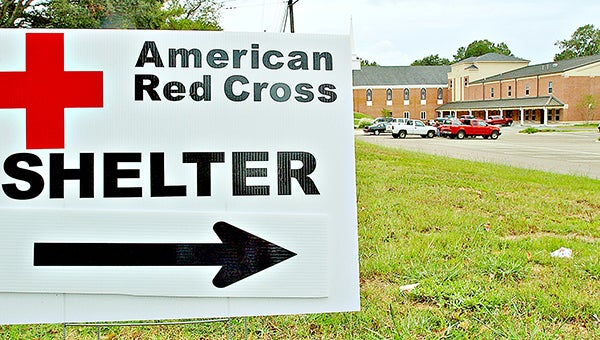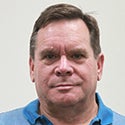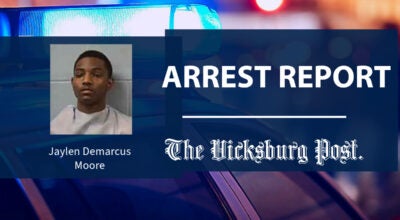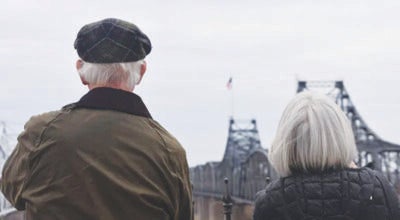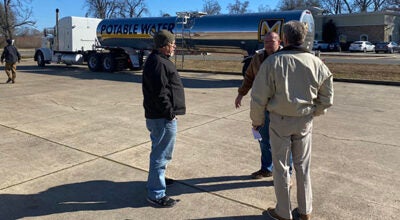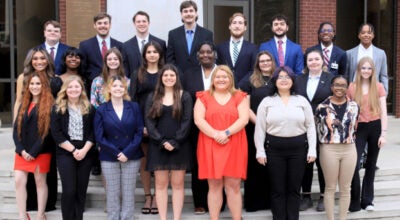Crossway answered ‘the call’
Published 12:00 am Sunday, August 30, 2015
By Jan Griffey
The Vicksburg Post
Randall Williams got a call at 1:12 a.m. on Sunday morning, Aug. 28, 2005, that changed his life.
The call was from an official with the American Red Cross, asking him to open Crossway Church as a shelter for those evacuating the Louisiana and Mississippi coasts following the devastation of Hurricane Katrina.
“I opened up the shelter at 1:42 a.m. That’s when I opened the doors to the church,” Williams said, who was in charge of the shelter at Crossway Church during Hurricane Katrina. “We had no plans, no real preparation except a couple of us had been through a one-day shelter course after Hurricane Ivan the year before. But Ivan was nothing. Katrina turned out to be the mama dog.”
Huge numbers of people began arriving on Sunday night and into Monday morning, from 320 to 350 total at the Crossway shelter, Williams said.
“I have been trying to capture what it was like in words. Some things were so great, yet so horrific at the same time,” he said. “It was the greatest outpouring of love I’ve seen anywhere. It was the church that I had heard preached in action. It was the community I hoped I lived in springing into action. It wasn’t just Crossway. It was the whole community that simply went into selfless service.”
The shelter at Crossway, and those at other churches in Vicksburg, became the port where the community could come together to provide hope, comfort and shelter and begin to meet the needs of the evacuees.
“We actually exceeded the needs of some,” Williams said.
He said the national media has given much attention since Katrina to government agencies, but little has been paid to the near-heroic acts of the volunteers who dropped everything in their own lives to help those in need. “That has made my blood boil,” he said.
The evacuees arrived, some in buses, some in their own cars, shell shocked, with only what they could gather up in a rush to leave their homes.
“They didn’t come with what the Red Cross asked them to bring. They left their medications behind. They were dirty, hungry. We had four showers — two for men and two for women. That was one reasons our shelter was desirable. We had showers, restrooms, and a kitchen. We provided three wonderful, hot meals each day,” Williams said.
The needs were great, but the outpouring of support from those in the Vicksburg community was outstanding. Many volunteers showed up at the church — leaving behind their own homes, damaged by spin-off storms from Katrina — to ask how they could help.
“At first we had no food. We ran out of toilet paper. But people started driving up and coming to me and giving me cash, lots of cash,” Williams said.
He said one older woman walked into the shelter and handed him a bag.
“I asked, ‘What’s this? Did you bake us some cookies?’ When I opened the bag, there was $10,000 in it,” Williams said.
The toilet paper need led to Williams’ first trip to buy supplies. He headed to the Vicksburg Kroger. The store had limited power, but was open for business.
“A woman who worked there came up to me and asked if I was from Crossway. I told her I was and she said the church had helped out one of her family members in the past. She asked if we needed food, and I told her we did. I was actually going to petition Kroger for some help for the shelter, but she said, ‘Come with me.’ She told us they had to get rid of all of the frozen food, all of the chilled food in the store because of the power situation,” he said. “I got in touch with some guys with trucks and we ended up with truckloads of food. I’m talking lobster and filet mignon. That’s a story of how God can take a need for toilet paper and turn it into six or eight truckloads of food.”
Williams said he witnessed similar incidents, which he calls miracles, during the five weeks the Crossway shelter was open to the storm’s evacuees.
The shelters became home to a very diverse group of people.
“We had a Muslim family, who were in this country as refugees from Palestine. We had a group of Polish adults who worked at the casinos on the coast. We had people with all kinds of mental and physical disabilities. We had lots with alcoholism and we had some criminals there. It was like one big dysfunctional community,” he said. “But all in all, I was highly impressed with the dislocated community. I think they did better than I would under similar circumstances.
“The whole thing was like a Noah’s Ark. We had dogs, cats, parrots and rabbits. We set up a makeshift animal shelter underneath the porticos of the church. During that first night, we ran out of usable space and some of the people arriving late were asked to sleep outside in sleeping bags under the porticos, or they stayed in their cars and just came in to use the facilities and eat.”
The biggest “trouble makers” during the time at the shelter were a family made up of several attorneys, Williams said.
“They made it a point of telling us how well off they were and that they wanted to be placed away from the ‘other people’ there. The whole time they were there they were nothing but a pain. I think they understood they had worn out their welcome because they didn’t stay long,” he said.
Williams is a retired employee of the U.S. Army Corps of Engineers Engineering Research and Development Center here. He said he has been around bureaucrats and the workings of government his entire career. However, the bureaucratic principles of operation were nowhere to be found in the operation of the church shelters here.
“I think the church was success at operating the shelter because everything was done with a spirit of trust. There was no hierarchy. Basically, we went into an asymmetric style of business. We made decisions on the fly and the few people in bureaucracies who tried to hinder us came to the understanding that in extraordinary times, extraordinary means are used. I never witnessed an organization perform so well, despite incredible chaos.
“I was so impressed by the people here because this community was damaged by the wind and rain and falling trees. We were without power at my house for 22 days. Yet, the volunteers, particularly women and retired and elderly, pushed themselves to the max. The ability of the church to respond and be effective in providing quality services and needs met and doing it in such a timely manner was so impressive. With each thing they did, it was done with respect. Their efforts should be legendary.”
Williams thinks God had a hand in helping with fulfilling the needs of the evacuees at the shelter and those of volunteers working there. “It was a surrealistically weird time. I remember walking around the church at 2 in the morning and thinking about what was happening. It felt like end times, like the things from Revelations,” he said.
“One of the things I keep thinking about is how tremendously exhausted the volunteers in the shelter were, yet, they kept getting propped up by an energy source that was beyond them.
“We needed some gasoline and didn’t know where we were going to get it, and this family drove up, who told us they were on their way to Texas and said they had six five-gallon cans of gasoline they wanted to give us. That’s the kind of thing that happened time and time again,” Williams said.
He said a group of evacuees were talking and one asked why God chose to destroy their homes.
“One of the wise old men there answered, ‘If God had a hand in it, it was for us to go out and see what the goodness of people can be in places like Vicksburg and take that goodness back home with us,’” Williams said.
After five weeks, those at the shelter helped the remaining evacuees find apartments and get back on their feet. Volunteers, like Williams, who had devoted their lives to helping, found it a bit difficult to return to a “normal life,” he said.
“I had a great time, as odd as that sounds,” Williams said. “I was sad when it was over with. It was a mountaintop experience. I just crashed. I crashed for about a year. Normal, every day living was boring for me. I was so proud of Vicksburg. Vicksburg rose up and stood tall.”
Williams lives in Vicksburg with is wife, Shirley Henry Williams. The couple is parents of three grown daughters — Rebecca, Melanie and Melissa.
•
Jan Griffey is editor of The Vicksburg Post.


